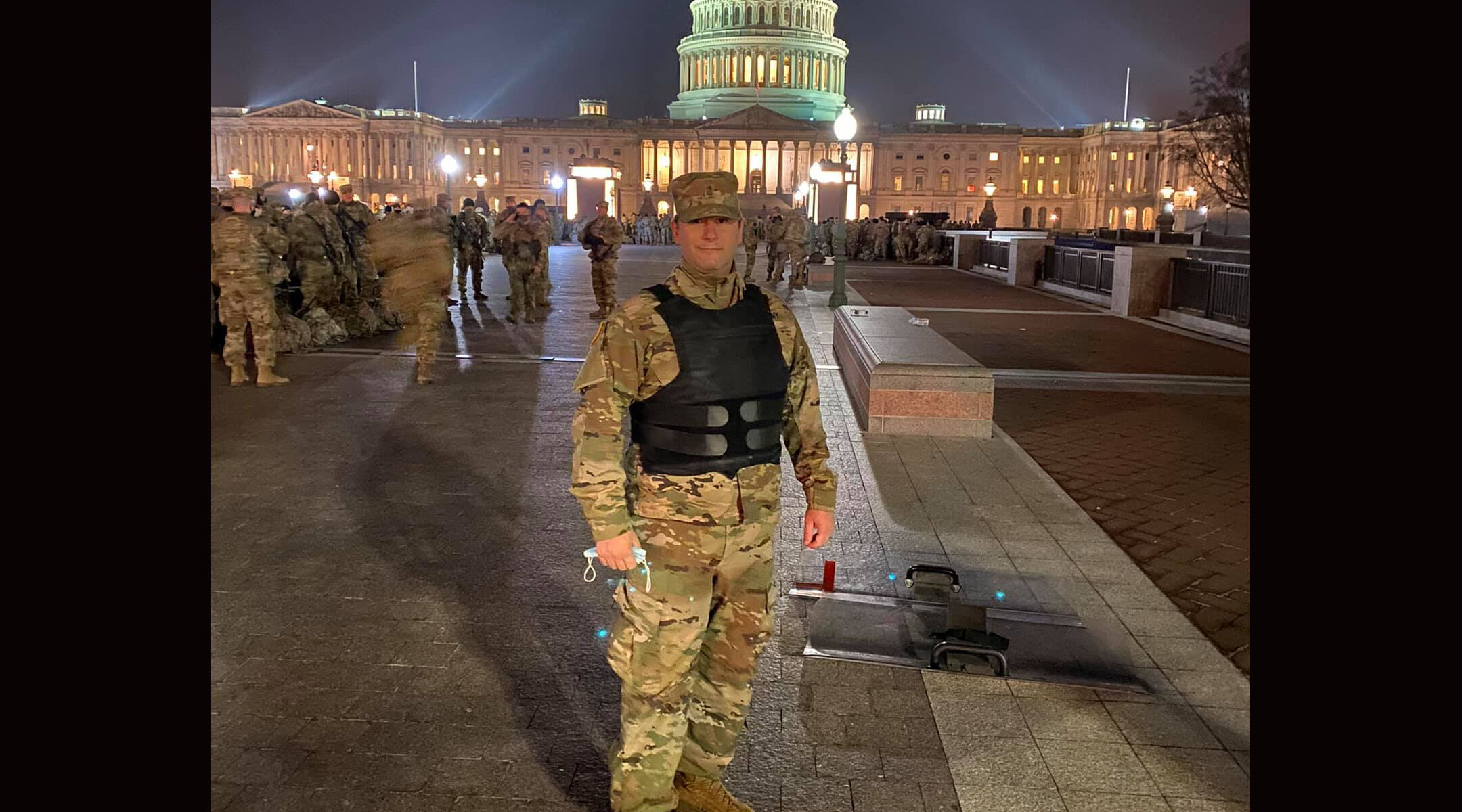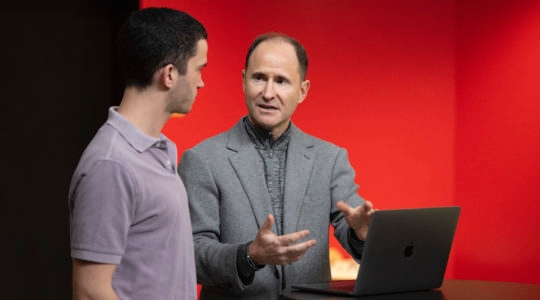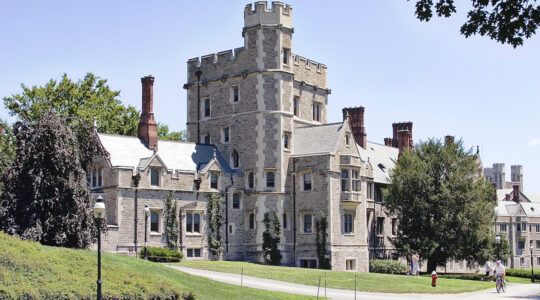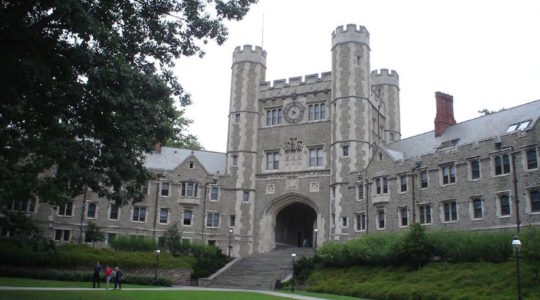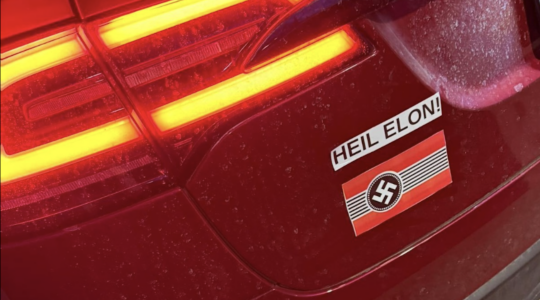(JTA) — As Jordan Hersh watched on TV as supporters of President Donald Trump stormed the U.S. Capitol building Jan. 6, he had a thought unique to most American rabbis: It might be time to head to his second job.
Hersh is a chaplain in the Maryland Army National Guard, the only rabbi in the state’s military clergy ranks.
By that evening, Hersh was in uniform and at the Capitol. The next morning, he sent a note to his congregants at Beth Sholom Congregation, the Conservative synagogue in Frederick, Maryland, he has led since 2014.
“My grandfather, Joseph Goldstein z”l, who fled a world where the rule of law often gave way to mobs, and whose yarzheit is this coming week, fought for this country because he believed deeply in what America stands for. He told me it was always the greatest honor of his life,” Hersh wrote.
“Like so many before me, my grandfather and I both swore to defend the constitution against all enemies foreign and domestic,” he added. “I did not fully understand the later part of this oath until yesterday. And I, along with my Army National Guard Unit, have now been tasked with doing just that.”
Nine days later, Hersh is still in D.C., one of more than 20,000 National Guard troops from across the country who have amassed in the nation’s capitol in advance of Inauguration Day, amid the threat of additional violence. He’s been alternating sleeping on the floor of federal buildings and resting in local hotel rooms that the Army has secured for off-duty soldiers, while meeting the needs of both his soldiers and his congregation.
Hersh expects to remain in Washington for the foreseeable future, an hour from his wife, two young children and congregation. “Definitely the inauguration and beyond,” he told the Jewish Telegraphic Agency. “We’ll have to see what happens.”
We spoke with Hersh about his path to military chaplaincy, his experiences this week and the Jewish resonance of his service at the Capitol. This interview has been edited for length and clarity.
JTA: How did you end up being a chaplain in the National Guard?
Hersh: In many ways the military has always been something that I aspired to when I was young. I grew up listening to my grandfather tell his stories as a noncommissioned officer in World War II. When I was younger, in the “Top Gun” era, my real dream was to go to the Air Force Academy and be a fighter pilot, but that didn’t happen. Then before rabbinical school, when I was just studying at the Conservative Yeshiva, which is where [my wife Shulie] and I met, I originally was planning on making aliyah and and serving in the army in Israel but decided, really, to come back to the states to marry Shulie, and to make a long story short, it was something I kind of forgot about.
In the meantime I had many friends who deployed, and some who struggled to readjust on their way back. So I learned that there was a need in our military for helping the spiritual, emotional needs of our soldiers. And over the course of the years I had gained that pastoral skill.
And then, at the Rabbinical Assembly convention about four years ago, I heard Chaplain Colonel Larry Bazer, the state chaplain for the Massachusetts National Guard, talking about honoring military chaplains. At the end of his talk he said “If you’re under 40, come talk to me,” so I did. That started my journey to be able to serve not just the Jewish community but the community of soldiers in our country.
You are the rabbi at a synagogue. How does that work with your National Guard responsibilities?
The general phrase you’ll hear from both the National Guard and the Reserves is “one weekend a month, two weeks a year.” Being Jewish, I don’t drill [participate in training] on Shabbat, generally. So generally I’m gone one Sunday a month, and then I make up that time during the week. This is my other congregation. And then there are two or three weeks over the summer.
Overall the [synagogue] congregation is very supportive. We are a part of the Army’s process and deployment cycle so being deployed overseas is quite possible. When I was talking to my board initially about doing this — I don’t need their permission legally, but I said I wouldn’t do it without their blessing — someone raised what happens if you’re deployed? And the [board] president at the time said, well, that’s how we get to serve as a congregation.
Have you been deployed previously?
We responded to the country during the COVID-19 uptick in the spring. Similar to this, it was very short notice. This is one of the things that we all know in our congregation and our families is part of the military life. We went in for a three-day drill. And at the end of that Sunday back in March we were told, go home and pack for two weeks, because COVID was ramping up and we were going to help set up field hospitals and testing sites around the state. A lot of soldiers didn’t go home for three months. It was a powerful experience and one that was my first with something like this.
Many people have seen pictures of National Guard troops sleeping in or gathered at the Capitol. What is the situation like for you right now?
We were there until yesterday. The National Guard from all over the country is here, all over D.C. So my unit is still on the Capitol complex, but not in the building itself. We’re in another building that’s like the Senate building, with the offices for the senators and such.
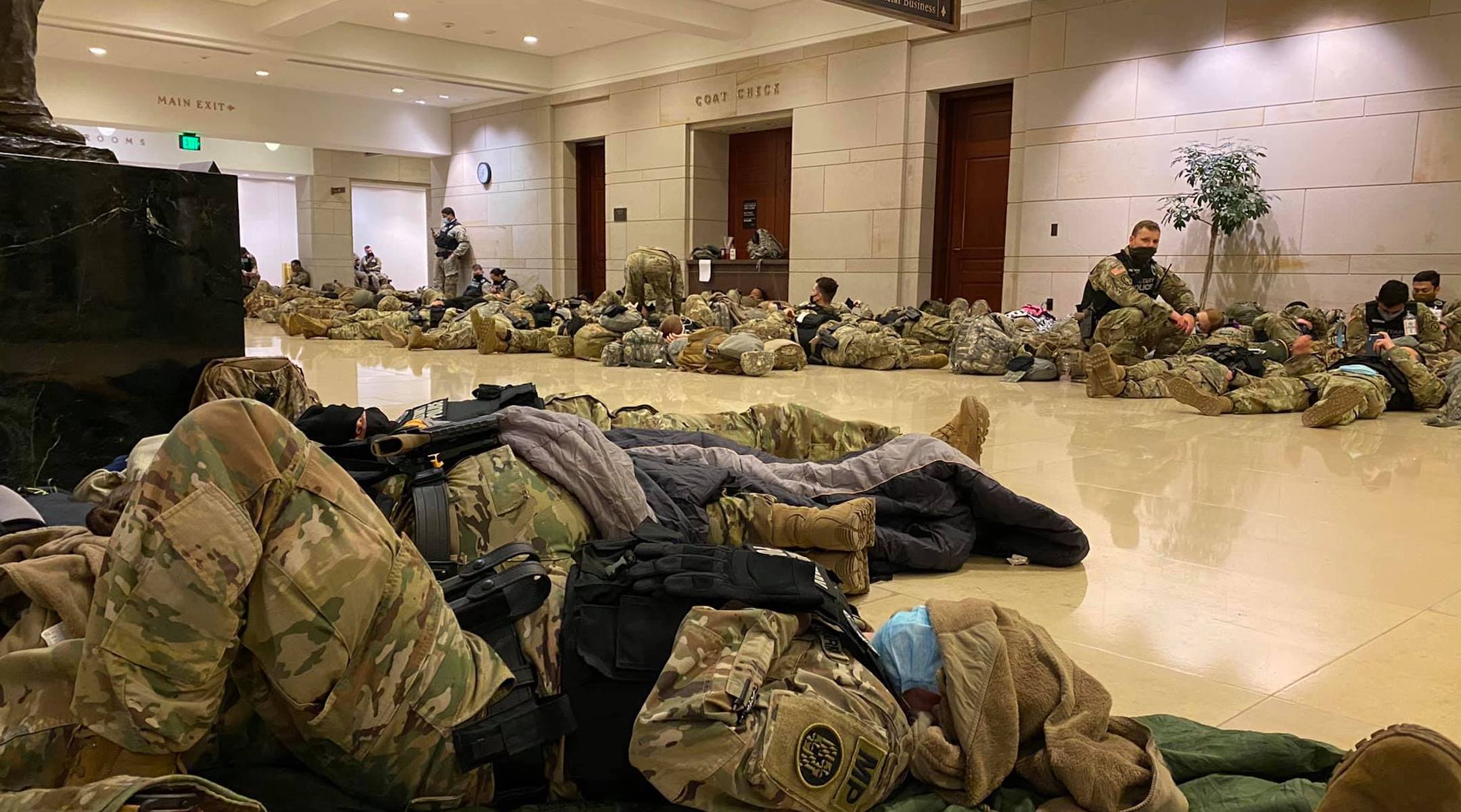
Soldiers sleeping on the floor of the U.S. Capitol building Jan. 13, 2021. (Jordan Hersh)
What is the role for a chaplain in all this?
The Constitution has two clauses related to religion: the Establishment Clause, which prohibits the government from establishing a religion, and the Free Exercise Clause, which prohibits the government from doing anything that infringes on your free exercise of religion.
So just as our soldiers defend the rights of Americans by securing our needs around the world, the chaplains of the military secure the rights of our soldiers, and their First Amendment rights. In the U.S., military chaplains are not religion-based. In other countries they are: In the British military, a Jewish chaplain works with Jewish soldiers. I am the chaplain for my entire unit, regardless of their religion.
I have a Muslim soldier, so it’s my job to ensure that he has his halal meals. We have a Norse pagan soldier, who’s trying to get an exemption from the military grooming standards to grow a beard because that’s part of his religion, so it’s my job to help facilitate that process for him as much as it’s my job to ensure that I’m here for Jewish soldiers. That’s part of it.
And then just like in any rabbinate, there’s the pastoral part. A big part of my job is being a pastoral presence for my soldiers, someone they can talk to regardless of religion, regardless of even any sense of religiosity. One of the beautiful things about the military chaplaincy is we have 100% confidentiality, which means that no matter what a soldier tells me, it stays with me, unless they give me explicit permission to share. So it provides a safe space for soldiers to be able to talk through issues they’re having whether it’s in the military or in civilian life. I’m also present for not just soldiers but their families. So, for example, yesterday I had a conversation with one of my soldier’s wives — it’s a lot to become a suddenly single person with kids, so I was helping her process that experience.
I just led a service. I have very few Jewish soldiers, so my services are more non-denominational. My goal is, as the chaplain of my battalion, to make sure when I say a prayer or lead a prayer service that everybody can say “amen.”
One thing we’ve heard from our readers is that Jan. 6 was unsettling for many people, but we are particularly unsettled as Jews in America. I’m curious if there’s anything that you would say as a rabbi to respond to that.
One of the things that I have found most powerful about being in the military is I have soldiers here who had never met someone Jewish, and when I first got here, there were moments when I might have felt hesitancy because of the unknown of what being Jewish is — and I’m visibly Jewish, with my kippah. But overall I have found that the soldiers I interact with are curious people who want to get to know people.
There’s a saying we have: Everyone’s green in the Army. And that’s a feeling that feels real a lot of the time, that we are a family, and it doesn’t matter what religion we are, what race we are, what nationality we are, we are all serving a common cause. It sounds almost cliche but it really creates that unifying factor.
In a more general sense, yes, as Jews in the country, we’re definitely on edge. Without a doubt over the past couple of years, and it kind of hit the apex with the Pittsburgh massacre, anti-Semitic incidents are rising all across the country.
But my experience is that even though that’s happening, there are also more and more voices of comfort and of unity calling out. Where I live in Frederick, Maryland, after Pittsburgh, our parking lot was overflowing with people who came for a vigil. When there was a swastika drawn on the sidewalk in town, some random person walking to work that morning went into a store and bought some chalk and turned it into four boxes that said “No hate in Frederick.” So amidst all the divisiveness, and isolation, and amidst the polarization and the fear that many American Jews and others are feeling, I have also found an immense amount of love coming from our communities, and that’s something that I take refuge in. There’s anxiety, but like so much in life, I choose to focus on where I find God in the world and that’s in the love I experience in connection with my fellow human beings, whether it’s in my community, or in the Army.
You posted some reflections, specifically about being in the Capitol and about the seat of government, on Facebook. For many people this place carries almost spiritual significance. What can you highlight from your experience?
It has been incredibly surreal. We are a group of people, in the National Guard, who expect to be deployed to wars, we expect to be called up in natural disasters. We expect to have those moments where we’re called up to help the community. Nobody expected this.
And being in that building — I had actually never been inside the Capitol, even though I live right outside D.C. My first time in this building, it’s just filling — constant, endless — with soldiers being bused in.
It was incredibly powerful and what it actually reminded me of — sometimes you go to Yad Vashem in Jerusalem, and there’s all the soldiers there visiting, doing their tours. There have been times I’ve been there during the day where it’s just full of soldiers, and that’s kind of what it felt like, that there was something holy about this space.
Even though we were all tired, and it was bitter cold outside at night, and many of us were standing for hours and hours out there, there was a real sense of sharing the gravity of the moment. Not once did I hear a soldier say, “I’d rather be anywhere else” or “I want to go home.” There was a real sense of understanding and just like a spiritual experience, just like a religious experience, the essence of which, in my mind, is feeling connected to something greater than yourself. That’s what we experienced that moment.
We all felt like we were a part of something greater than our own selves and serving a cause greater than ourselves. I wasn’t sure what to expect, but it doesn’t matter what political party, whose sole aim is it spans the gamut of political affiliations and the military, but to a tee. Everybody understands why we’re here. And what our mission is about. And that this is not about politics. This is about what our country is and what it means to be an American.
Being there on the floor of the Capitol while deliberations were going on, it was almost an existential experience. We were really connected with the essence, the spirit of America, and therefore connected to one another.
Is there anything else you’d want JTA readers to know about you and your experience?
There is one thing. My grandfather came to this country and fought in World War II. He always said that this country, which literally saved his life and the life of this family, was a refuge. And the Army in particular was part of that.
He had this story from North Africa, of when the Catholic chaplain gave him a Jewish prayer book, a siddur. He was coming from a country where Easter was the scariest day of the year because the Poles would go looking for Jews to beat up, so for him that represented everything that was right about this country.
No country is perfect — we’re a country of human beings run by human beings — but this is a place where the Jewish people can be contributors to shaping the society, shaping our culture. For me, the military is one way to do that. As Jews, we are called to be a light unto the nations. And what that means to me is being a part of our world and working in our own way to make our world better and more just, more free, more equitable in the ways that we can guide it through the lens of Torah.
JTA has documented Jewish history in real-time for over a century. Keep our journalism strong by joining us in supporting independent, award-winning reporting.
